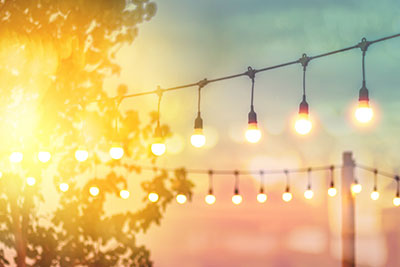 You put so much into the interior of your home, and maybe even its landscaping and outdoor spaces. But you may not have considered how the right outdoor lighting can protect your home and its contents; keep you and your family safe as you navigate walkways and entrances in the dark; and elevate your home's exterior and outdoor living areas. Here's what you need to know to begin the process of selecting and installing outdoor lighting for your home.
You put so much into the interior of your home, and maybe even its landscaping and outdoor spaces. But you may not have considered how the right outdoor lighting can protect your home and its contents; keep you and your family safe as you navigate walkways and entrances in the dark; and elevate your home's exterior and outdoor living areas. Here's what you need to know to begin the process of selecting and installing outdoor lighting for your home.
Outdoor Lighting Features & Options:
There are many things to consider before adding outdoor lights to your home, including the purpose of the lights and which features are most important to you. Some of the options available include:
Motion detection: These lights turn on when a person or animal approaches your home. Motion sensor lights have been shown to deter criminals and they can also make it safer for you to carry that heavy bag of groceries from the car to the kitchen without having to worry about finding a lightswitch.
Cameras and smart features: Many new outdoor lighting fixtures have a security camera and wifi capability built right in. These all-in-one systems will let you know when someone is at your home; allow you to see and talk to them from inside the house; and sound an alarm if you are in danger. These lights can also be turned on and their cameras monitored while you are away from the house.
Decorative elements: Investing in outdoor lighting can enhance your home's value and aesthetic, and there are a huge variety of options out there, from old fashioned lamp posts to modern sconces to spotlights. And it's often possible to get the security features you need without sacrificing the look you want so don't assume you have to settle for lighting that's practical but not pretty.
Solar: Yes, these lights are powered completely by the sun. Solar lights have come a long way, and there are many excellent options available. But they must be installed in an area that receives plenty of direct sunlight.
Dimmer: If you're designing a light scheme to highlight an outdoor space or walkway, dimmers are an excellent idea. They will allow you to control the mood, and conserve energy at times when you don't need quite as much light.
Installing New Lights:
Depending on what you choose, installing your new lights could be as simple as digging a hole, or it could require doing some wiring into your home's electrical system. If you're a confident DIYer, and with a little guidance from your local hardware store, you may be able to handle the setup on your own. But if you have any doubts, it's best to contact a professional electrician to get your lighting properly installed. And remember, if any of your lights will be in-ground, you should always call before you dig even a small hole to make sure you don't hit any important power, water or sewer lines.
For any home insurance questions, call or contact Litaker Insurance today.
